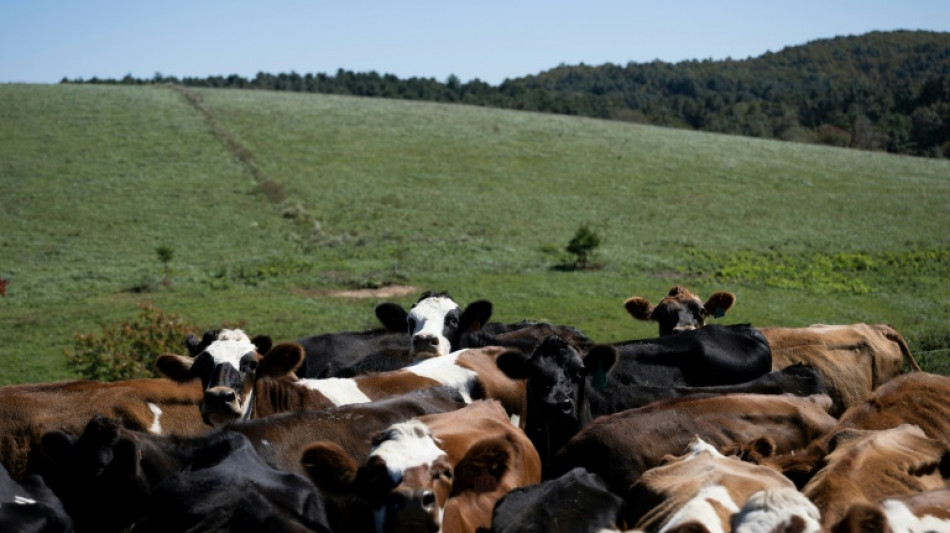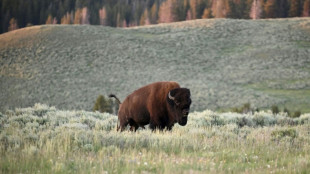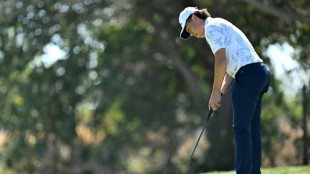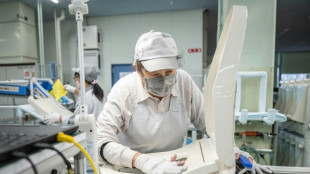
-
 US approves $825 mn missile sale to Ukraine
US approves $825 mn missile sale to Ukraine
-
Rubio to visit Mexico, Ecuador next week to discuss migration, China: US

-
 Lyles edges Tebogo in Zurich thriller in perfect Tokyo boost
Lyles edges Tebogo in Zurich thriller in perfect Tokyo boost
-
Lyles trumps Tebogo in Zurich, Alfred shines

-
 Arsenal optimistic about Havertz return after knee surgery
Arsenal optimistic about Havertz return after knee surgery
-
Pressure-free Wong relishing US Open adventure

-
 RFK Jr bashes US health agency after its chief is sacked
RFK Jr bashes US health agency after its chief is sacked
-
Swiatek wobbles at US Open as Sinner targets third round

-
 Alfred storms to 100m victory at Diamond League finals
Alfred storms to 100m victory at Diamond League finals
-
Bison herds 'reawaken' Yellowstone's prairies

-
 RFK Jr bashes US health agency after firing its chief
RFK Jr bashes US health agency after firing its chief
-
Swiatek labours into US Open third round

-
 UN sets 2027 exit for Lebanon peacekeepers after Israeli strikes
UN sets 2027 exit for Lebanon peacekeepers after Israeli strikes
-
Brazil police target network that siphoned billions from fuel sector

-
 Liverpool and Man City face Real Madrid in Champions League, PSG get tough draw
Liverpool and Man City face Real Madrid in Champions League, PSG get tough draw
-
'Strangest' dinosaur covered in spiked armoury: scientists

-
 UN Security Council votes for Lebanon peacekeepers to leave in 2027
UN Security Council votes for Lebanon peacekeepers to leave in 2027
-
Badminton federation smoothes feathers ruffled by shuttlecock shortage

-
 Luxury carmaker Lotus to slash UK jobs amid US tariffs
Luxury carmaker Lotus to slash UK jobs amid US tariffs
-
Small parcels in limbo as Trump moves to end US tariff exemption

-
 Russian attack killing 19 in Kyiv unleashes international fury
Russian attack killing 19 in Kyiv unleashes international fury
-
UN chief condemns 'endless' Gaza horrors as Israel presses offensive

-
 Vine claims solo Vuelta stage six victory, Traen takes lead
Vine claims solo Vuelta stage six victory, Traen takes lead
-
Emma Stone stars in apocalyptic satire at Venice Film Festival

-
 England skipper Aldcroft to miss rest of Women's Rugby World Cup pool phase
England skipper Aldcroft to miss rest of Women's Rugby World Cup pool phase
-
Norris sees others closing gap with dominant McLaren

-
 UK govt seeks to overturn ban on housing migrants in hotel
UK govt seeks to overturn ban on housing migrants in hotel
-
Europe powers move to Iran sanctions 'snapback' over nuclear drive

-
 Russian attack kills 18 in Kyiv, unleashes new international fury
Russian attack kills 18 in Kyiv, unleashes new international fury
-
'Ruins': Pakistan's Punjab reels from flood surge

-
 Struggling Hamilton aims to rediscover the joy
Struggling Hamilton aims to rediscover the joy
-
Europe powers move to reimpose UN sanctions on Iran over nuclear drive

-
 US Fed Governor Lisa Cook sues Trump over move to fire her
US Fed Governor Lisa Cook sues Trump over move to fire her
-
Froome hospitalised after training crash in France

-
 Russian attack kills 17 in Kyiv, unleashes new internatioinal fury
Russian attack kills 17 in Kyiv, unleashes new internatioinal fury
-
Prince Harry to visit UK on anniversary of queen's death

-
 'Something has to change', says Amorim after United humiliation
'Something has to change', says Amorim after United humiliation
-
Stocks mixed after Nvidia record earnings

-
 Actor Micheal Ward in UK court on rape charges
Actor Micheal Ward in UK court on rape charges
-
EU summons Russian envoy after mission damaged in Kyiv strike

-
 Deadly Russian attack kills 15 in Kyiv, raising fears for peace talks
Deadly Russian attack kills 15 in Kyiv, raising fears for peace talks
-
Swiss court rejects Islamic scholar Ramadan's rape conviction appeal

-
 Russian attack kills 14 in Kyiv, including three children
Russian attack kills 14 in Kyiv, including three children
-
Swiss economy set to slow due to US tariffs

-
 Hong Kong media mogul Jimmy Lai verdict to come 'in good time': judge
Hong Kong media mogul Jimmy Lai verdict to come 'in good time': judge
-
Swiss court rejects Tariq Ramadan rape conviction appeal

-
 Asian markets mixed after Nvidia earnings
Asian markets mixed after Nvidia earnings
-
Rising Australian golfer makes comeback after losing sight in left eye

-
 Scandal facing sister of Argentina's president: 3 things to know
Scandal facing sister of Argentina's president: 3 things to know
-
Need a pee? Japan has QR code for that


US cheesemakers learn to live with raw-milk regulations
With its brown-and-white cows grazing on a grassy hillside high in the Appalachian Mountains, Meadow Creek Dairy is not like most other American cheesemakers: its products are made from unpasteurized, or "raw" milk.
The small family business in the eastern United States is a rarity in the nation's dairy market, dominated by industrial cheesemakers exclusively using pasteurized milk.
In their blue overalls and caps, Helen Feete and Ana Arguello work before huge vats, each containing hundreds of gallons of milk.
Feete, who founded the dairy with her husband in the 1990s, told AFP that when they started out "there weren't any models for us to follow" -- few small dairy farms were trying to make cheese from raw milk.
Methods viewed as traditional in Europe -- even the source of regional pride -- are seen as nearly taboo on the other side of the Atlantic.
The essential difference is that pasteurized milk has to be heated -- to 63 degrees centigrade (150 Fahrenheit) for 30 minutes, or 72 degrees centigrade (162 Fahrenheit) for 15 seconds.
That kills the microflora in the milk, which has a major impact on flavor -- and not for the better, say partisans of the raw-milk approach.
There is "a complexity of flavor and a uniqueness of flavor... that is only possible when the milk is unpasteurized," said Liz Thorpe, an American author of books on cheese.
- 60 days' aging -
Detractors of unpasteurized cheeses, on the other hand, say there is a higher risk of bacteria and microbes in raw milk, which can cause potentially lethal diseases such as salmonella and listeriosis.
The US Food and Drug Administration (FDA) requires the "mandatory pasteurization for all milk and milk products in final package form intended for direct human consumption."
But since the 1940s, the agency has allowed the sale of raw-milk cheeses so long as they have been aged at least 60 days at temperatures above 2 centigrade (36 Fahrenheit).
- 'Frustrating' -
"That's not so much a hurdle, it’s something that we have to build our cheeses around," said Kat Feete, who has worked much of her life with her parents and brother at Meadow Creek.
The FDA's 60-day rule is meant to provide time for all dangerous pathogens in raw milk to die off, but it prevents the sale of raw-milk-based soft cheeses that mature quicker than that.
"It can be frustrating that there are certain types of cheeses we can’t do," said Kat Feete. "A lot of people would love to have a raw-milk brie or something small like that."
Most of Meadow Creek's cheese are semi-hard. Produced seasonally -- depending on what the cows eat at different times of year -- they mature in the dairy's cellars, where the temperature and humidity is regulated.
A top seller, a semi-hard cheese called the "Grayson," might be compared to a Reblochon from the Alps, or to a Maroilles from the north of France.
- 'Not correct' -
Meadow Creek Dairy and other raw-milk cheesemakers in the US face another obstacle: many American consumers remain skittish about buying a product they think may be unsafe.
"So many people in the US think that raw-milk cheese patently is illegal, and that's not correct," said Thorpe. "There's a lot of misconceptions."
She said she works hard to inform the public that such cheeses are "perfectly healthy, safe and good," adding that it's important for a consumer to know where a cheese comes from.
In Meadow Creek's early days, "there was a little bit more trouble with educating the market to what we were doing because there was a perception that it was not very safe," Kat Feete said.
But that is beginning to change, she said.
"I think people are really starting to accept that raw-milk cheese is a safe and a good way for a farmstead small cheesemaker to produce cheese."
W.Lapointe--BTB



